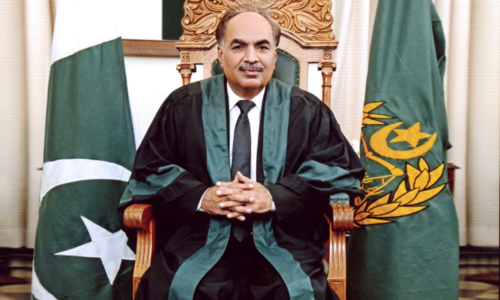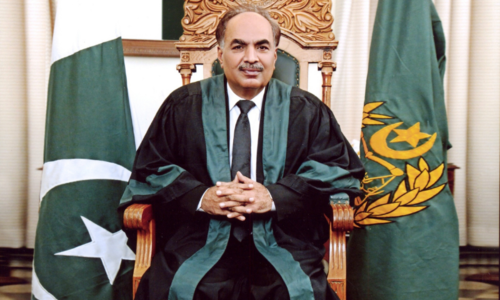ISLAMABAD: As the controversy surrounding the appointment of Sindh High Court (SHC) Chief Justice Ahmed Ali Sheikh as an ad hoc judge of the Supreme Court persists, a peep into the past revealed that 18 judges of different high courts or the apex court have served the top court in their capacity as ad hoc judges during different periods.
After the end of their term as ad hoc judges, some of them became permanent judges of the apex court, whereas one was reverted to his parent high court and then again elevated to the Supreme Court as a permanent judge. A few SC judges, after their retirement, become ad hoc judges of the apex court. Many among the ad hoc judges later become the Chief Justice of Pakistan (CJP).
Unlike Justice Ahmed Ali Sheikh, the only distinguishable feature is that none of the ad hoc judges were chief justices of their respective high courts when they were appointed to the Supreme Court as ad hoc judges.
Justice S.A. Rehman, a judge of the then West Pakistan Lahore High Court, was appointed as an ad hoc judge of the apex court where he served from March 2, 1955 to May 23, 1955. He later became a permanent judge of the apex court where he served from April 2, 1958 to March 1, 1968. Justice Rehman also became the CJP during that period.
Likewise, Justice Waheeduddin Ahmed, the father of Justice Wajeehuddin Ahmed, was a permanent judge of the apex court from Sept 22, 1969 to Sept 20, 1974. He was then appointed as an ad hoc judge of the apex court for the period between May 23, 1977 and Feb 6, 1979.
Justice Nasim Hassan Shah was appointed as an ad hoc judge of the Supreme Court from the LHC during the period between May 18, 1977 and June 14, 1979. During that period, he was also a member of the seven-judge bench which upheld the death sentence of former prime minister Zulfikar Ali Bhutto in a split verdict by four to three during the military regime of Gen Ziaul Haq, who had overthrown the PPP government in July 1977.
Justice Shah was later appointed as a permanent judge of the apex court where he served from June 1979 to April 16, 1993 and also became the CJP.
Justice Shafi-ur-Rehman of the LHC was appointed as an ad hoc judge of the apex court where he served from June 14, 1979 to July 29, 1981. He then became a permanent judge of the apex court and served from July 31, 1981 to Feb 15, 1994.
Justice Fakhruddin G. Ebrahim of the SHC was made an ad hoc judge of the apex court where he served from June 17, 1980 to March 25, 1981 before retirement.
Justice Saad Saood Jan of the LHC served as an ad hoc judge of the apex court from Oct 5, 1986 to March 24, 1987 and then as a permanent judge from March 25, 1987 to June 30, 1996. During that period, he was appointed as an acting chief justice, but never made the CJP.
Justice Nasir Aslam Zahid, a judge of the SHC, was made an ad hoc judge of the Supreme Court from Jan 28, 1991 to April 28, 1991. He was later reverted to the SHC and again elevated as a permanent judge of the Supreme Court where he served from April 18, 1996 to Jan 26, 2000. Justice Zahid was one of the few judges who refused to take the oath under the Provisional Constitution Order (PCO) promulgated by military ruler Gen Pervez Musharraf after having overthrown the PML-N government in a bloodless coup on Oct 12, 1999.
Justice Irshad Hasan Khan of the LHC was made an ad hoc judge of the Supreme Court from Oct 19, 1994 to May 29, 1995. He served as a permanent judge of the apex court from May 30, 1995 to Jan 25, 2000.
Justice Hasan later become the CJP and validated the 1999 coup by delivering a judgment known as the Zafar Ali Shah case of 2000. He was later appointed as chief election commissioner, supervising the 2002 referendum to allow Gen Musharraf to continue serving as president of the country.
Justice Mukhtar Ahmed Junejo of the SHC was made an ad hoc judge of the Supreme Court from Oct 19, 1994 to Feb 21 1995 and later as a permanent judge from March 31, 1996 to Feb 19, 1998.
Justice Muhammad Bashir Jehangiri, a judge of the Peshawar High Court, was made an ad hoc judge of the apex court from Feb 22, 1995 to March 29, 1996. He became a permanent judge from March 30, 1996 to Jan 6, 2002 and also served as the CJP.
Justice Mamoon Kazi of the SHC served as an ad hoc judge of the apex court from Feb 22, 1995 to April 14, 1996 and then as a permanent judge from Nov 4, 1997 to Jan 26, 2000.
Justice Hamid Ali Mirza, a judge of the SHC, was made an ad hoc judge of Supreme Court from Sept 14, 2005 to Sept 13, 2007 and then as a permanent judge from April 24, 2000 to Sept 13, 2005.
Justice Khalilur Rehman Ramday served as a permanent judge of the Supreme Court from Jan 10, 2002 until Jan 12, 2010. After his retirement, he was made an ad hoc judge of the apex court where he served from Feb 18, 2010 to Feb 17, 2011.
Justice Ramday also headed a 13-judge SC bench which reinstated Justice Iftikhar Muhammad Chaudhry as the CJP after he was deposed by Gen Musharraf on March 9, 2007.
Justice Ramday’s appointment as an ad hoc judge also created quite a stir in the country, leading to a tussle between the executive and the judiciary. The standoff ended after a rare meeting between then prime minister Yousuf Raza Gilani and then CJP Iftikhar Chaudhry. The prime minister had surprisingly reached a farewell dinner hosted in honour of Justice Ramday where he invited the chief justice for a meeting the next day where the demand for appointment of Justice Ramday was accepted.
However, the Supreme Court later gave up its decision to extend the tenure of Justice Ramday for another term in view of the public uproar and criticism.
Justice Karamat Nazir Bhandari of the LHC was made an ad hoc judge of the Supreme Court from Sept 7, 2002 to Dec 31, 2003 and after that he retired.
Justice Ghulam Rabbani served as a permanent judge of the Supreme Court from Sept 14, 2006 to Oct 19, 2009 and was then appointed an ad hoc judge till Oct 19, 2011.
Justice Khilji Arif Hussain was a permanent judge of the apex court from Sept 9, 2009 to April 12, 2014 and after his retirement he was retained as an ad hoc judge from Dec 14, 2015 to Dec 13, 2016.
Justice Tariq Parvez served as a permanent judge of the Supreme Court from Oct 20, 2009 to Feb 14, 2013 and after his retirement he was made an ad hoc judge from Dec 13, 2015 to Dec 13, 2016.
Published in Dawn, August 19th, 2021















































